| PalestineRemembered | About Us | Oral History | العربية | |
| Pictures | Zionist FAQs | Haavara | Maps | |
| Search |
| Camps |
| Districts |
| Acre |
| Baysan |
| Beersheba |
| Bethlehem |
| Gaza |
| Haifa |
| Hebron |
| Jaffa |
| Jericho |
| Jerusalem |
| Jinin |
| Nablus |
| Nazareth |
| Ramallah |
| al-Ramla |
| Safad |
| Tiberias |
| Tulkarm |
| Donate |
| Contact |
| Profile |
| Videos |
So Far, So Good By Morris L. Ernst |
 Pre-Nakba picture of a Palestinian Christian girl from Bethlehem who "didn't exist," Zionists say!
Pre-Nakba picture of a Palestinian Christian girl from Bethlehem who "didn't exist," Zionists say!To develop dreams for F.D.R. was a joy. To have even a small proportion come to life, at times years later, was a great satisfaction and added, so my friends told me, to my conceit. Not all my chores were of such vast dimensions, but let me tell one other tale of exciting possibilities.
F.D.R. was, it seemed to me, always aware of the Palestinian tinderbox. He had one fixed idea: Hitler should not be allowed to win the war on any front, and particularly not one of a racist or religious nature. All those pushed around because of race, creed, color, or political belief must be treated as special wards of the victorious Allies. Although today only twenty percent of the DP’s in Europe are Jews, during the war, it seemed as though 80 percent were Jews, and the thinking of our nation became concentrated on the Jewish problem. This does not mean that Freemasons, Catholics, socialists, and anticommunists were not also to be given needed protection, for no dictator—Hitler, Stalin, Franco, or another —should be allowed to imprison people because of their political or religious affiliations.
From various sources, there was an assumption that about a half million men, women, and children in Europe would want to leave the scenes of their misery. For many Jews, there had developed over the years—even centuries --the understandable idea that they were beyond adjustment—unassimilable. The homeland concept had been sold for years in an organized way. Palestine had been a kind of remittance society supported by the dollars of rich Americans of Jewish descent. No one knew for a certainty what the suffering, beaten Jewish people of Germany would do if offered their free choice of entrance to any nation on earth. In the absence of a wide choice, the answer to the question, “Where do you want to go to live out your lives?” would be “Palestine.” But what if Canada, Australia, South America, England, and the United States were all to open a door to some migration? Even today it is my judgment, and I have been in Germany since the war, that only a minority of the Jewish DP’s would choose Palestine. [Mr. Ernst wrote about the open secret that all knew well: to the vast majority of Europe's Jews, Palestine is the least desirable choice ( in other words, they prefer to live with the Gentiles). That is why Zionist leaders and organizations lobbied against any other haven, else there would be little Aliyah. This was the PRIMARY reason behind AIRLIFTING Arab Jews DIRECTLY from their homes.]
There was a time when people were allowed to roam their planet at will. Living standards in societies and nations did not vary too greatly. Hope of freedom from religious persecution was, at one time the main reason people left their ancestral homes. At other times, people moved to gain material benefits, not only for spiritual freedom or to escape a pogrom. Eventually, as many as a million people came to the United States in a single year, most of them because living was easier; gold was to be found on the streets. But as our nation grew in wealth, it attained the highest per capita income in the world. In 1930, for example, when our per capita income was $700, the United States held out a promise of almost twice as easy a life as that in Great Britain with a per capita income of $409, four times that of France, and 7 times that of Italy, which had a per capita income of $115. If we had not all but shut our doors, millions would have come to ourlucky land each year. Today the difference in the average man’s income between prosperous America and war-ravaged Europe is even greater. It’s my guess that at least forty-five million would seek entrance to our land if all barriers were let down. In a world of such wide discrepancies in living standards and freedom of individual living, the right to travel was curtailed. We are living in a world of embargoes on human travel to protect our own people. Of course, I agree with Ernest Bevin, who told me in May 1946 that the ultimate aim of his foreign policy was that anyone should be able to go to Victoria Station and buy a ticket to any place on earth.
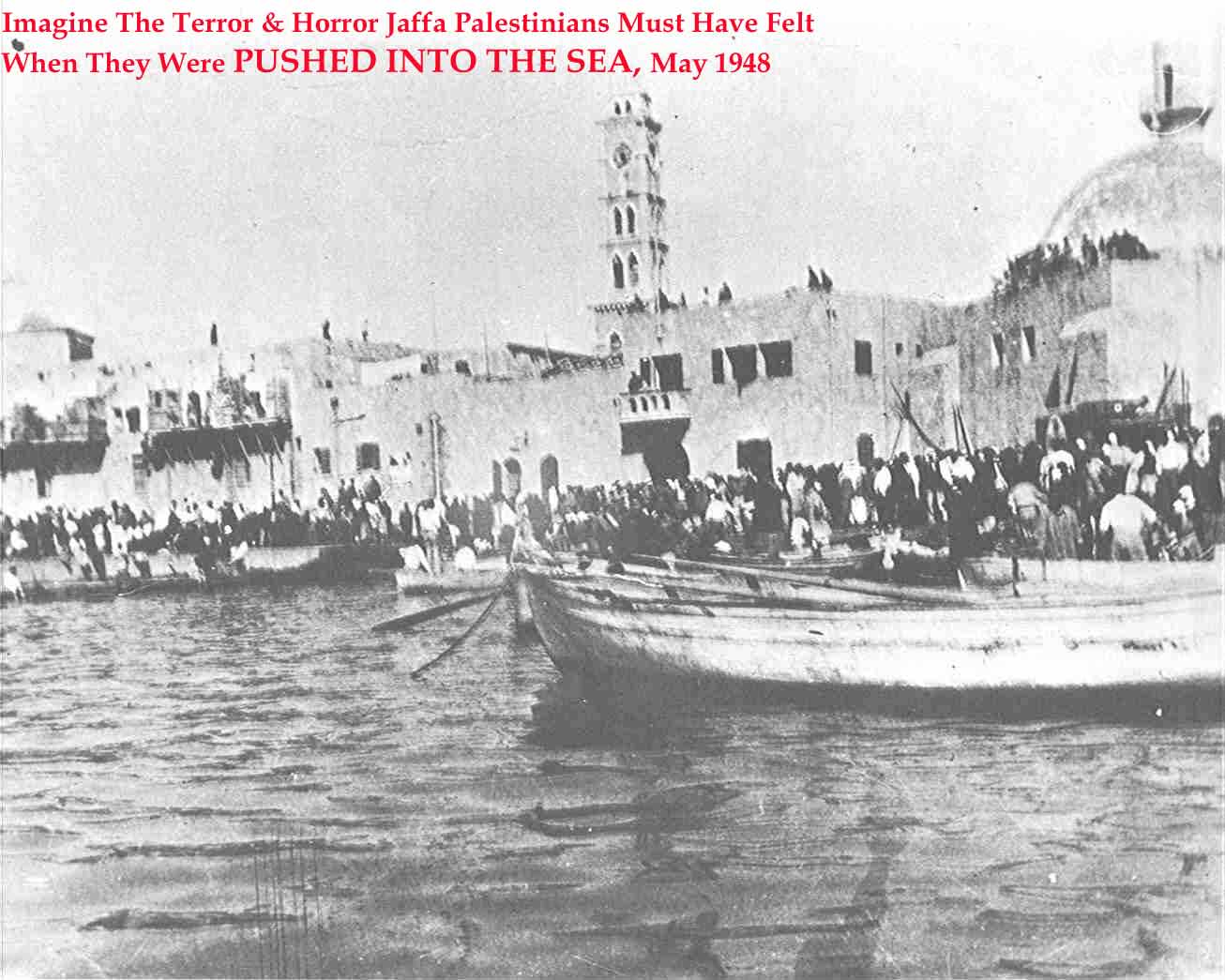 Remind us, please: who shall push who into the sea? Jaffa May 1948, Palestinians were being pushed into the sea by Zionist Jewish forces.
Remind us, please: who shall push who into the sea? Jaffa May 1948, Palestinians were being pushed into the sea by Zionist Jewish forces.I do not intend to discuss the Jewish-Palestinian problem other than to say that I am fearful of any racial religious state. Even for those who desire such a congeries of race and state, or for those who urge it for others, it seems less than the ultimate in the development of the brotherhood of man. Nor do I believe that the thousands of years of bitter persecution of the Jewish people ineluctably proves that the Jewish heritage will not ultimately fit into the conglomerate folkways of the nations of the world.
But the task I had from F.D.R. did not touch on Palestine except tangentially. Or at least so I thought. The President painted a picture with a big brush. He proposed a world budget for the easy migration of the 500,000 beaten people of Europe. Each nation should open its doors for some thousands of refugees. He told me that he could count on Chile, Venezuela, Brazil, Haiti, Canada, Australia, and others to agree to take in a total of over 150,000. I remember he put Venezuela down for a quota of 10,000, Haiti for 4,000; Chile for 5,000, and so forth. Canada, he thought, would come through for 30,000 to 40,000. He knew that the United States would be the toughest nation to persuade. The labor unions had, for several generations, fought the influx of foreign workers. The Legionnaires and the bigot groups had built up a virtual psychosis against aliens, and employers were no longer intent on importing labor into our manpower reserves. They had learned that cheap labor through excess supply was not a boon to industry and did not spell low-cost production.
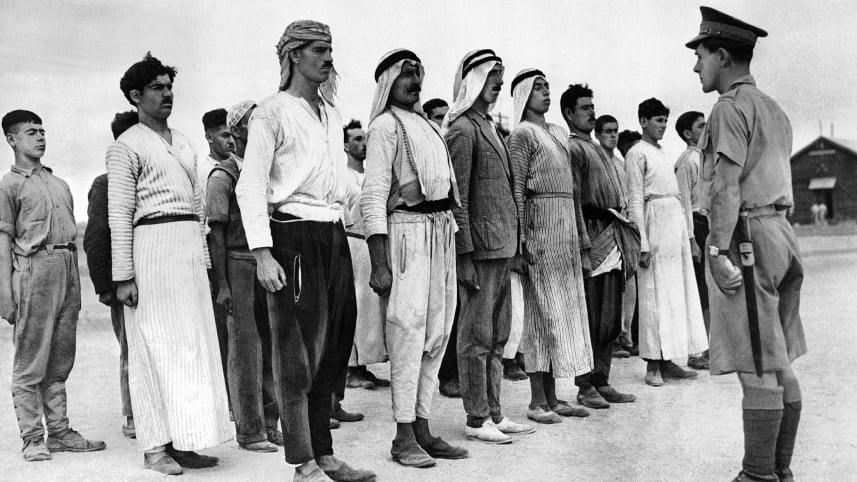 Twelve Thousand Palestinians were recruited to fight with the British army during WWII. Not like some imposters, many of those saw action in North Africa!
Twelve Thousand Palestinians were recruited to fight with the British army during WWII. Not like some imposters, many of those saw action in North Africa!I posed the problem and the plans to many and came back with as much assurance as an unofficial outsider could acquire. The simple answer: Great Britain will match the United States, man for man, in admissions from Europe. That island, with its depleted capital, with a shortage of food and fuel, would take in 150,000 more if we would do the same. It seemed all settled. With the rest of the world probably ready to give haven to 200,000, there was a sound reason for the President to press Congress to take in at least 150,000 immigrants after the war. (As a note for the record: Great Britain has received, to date more refugees than all the other nations of the world combined.)
I was delighted. Not that I had done any job worth recording. Delight was embedded in the hope and vision of the new program. Surely Congress would no longer dare to talk in isolated, stiff-necked terms of America for Americans. Above all, we could then for the first time face the Arabs with integrity and decency and have no hesitance in saying: “Your share, as appraised against the Palestinian mandate and the historic miracles the Jews have performed in enriching Palestine, should be at least 150,000.”
I am writing during the truce. No matter what happens politically in Palestine, immigration will still be the nub of the problem. The Arabs’ fear of minorization will not disappear overnight. The Jews will not be free of the peril of the day when they must reject immigration beyond the point of economic consumption capacity. F.D.R. saw this crux of the problem.
Such was the dream and plan of F.D.R. It is still a good plan. It is still not too late. Under the United Nations’ partition decree, it is more important than ever. It is still essential for our own integrity. It is still worthwhile for humanitarian reasons. Moreover, it would free us from the hypocrisy of closing our own doors while making sanctimonious demands on the Arabs. It is right, it is decent; and in our country we have learned that immigrant strains enrich our culture and aid in the development of the sciences and arts of living.
But it did not work out. I do not intend to quote F.D.R. or even to suggest that my appraisal of the defeat would agree in every detail with his. But to me, it seemed that the failure of the leading Jewish groups to support with zeal this immigration program may have caused the President not to push forward with it at that time. I talked to many people who were active in Jewish organizations. I suggested the plan. I made clear that no Jews or other people in Europe would be compelled to go anywhere and certainly not to any assigned nation. But surely, it would be wholesome to give these beaten people of Europe a choice. “Do you want to go to Ecuador, or Newfoundland, or Kansas, or Nottingham? The doors of the world are open. State your choice. If it’s Palestine, that also will be open. You, who are Jews, have felt that you have had no choice. It looked to you like Palestine or nothing. Palestine or detestable Nazi Germany seemed to be your only choices.”
I was amazed and even felt insulted when active Jewish leaders decried, sneered, and then attacked me as if I were a traitor. At one dinner party, I was openly accused of furthering this plan of freer immigration in order to undermine political Zionism. Those Jewish groups which favored opening our doors gave little more than lip service to the Roosevelt program. Zionist friends of mine opposed it.
 Which hate speech is more antisemitic: Hitler's hate speech at the Reichstag on Jan 30th, 1939, or Ben-Gurion's hate speech a month after the Kristallnacht pogrom in December 1938? You be the judge!
Which hate speech is more antisemitic: Hitler's hate speech at the Reichstag on Jan 30th, 1939, or Ben-Gurion's hate speech a month after the Kristallnacht pogrom in December 1938? You be the judge!It is still the plan for Jews and Gentiles of the DP camps for much of Europe. What of the poor devils Russia wants to return to Siberia? What of the 80 percent—the 700,000 non-Jewish flotsam of Europe? And above all, if the United Nations encounters further difficulties in enforcing partition, is not the public opinion of the people of the world the final and only civilized weapon? The Arabs have been put in a favorable position by the closed door-open lip hypocrisies of other nations, including our own. Let’s open our own doors jointly with all other nations. I suggest that this would immeasurably reduce the heat of the Jewish-Arab controversy in the years to come. Even if other nations will not join us, we, for the sake of our own national integrity, should maintain our old-fashioned pattern of asylum for the oppressed and the tortured. We should never forget that we are literally a nation of immigrants.
Click here to browse online.
Disclaimer
The above documents, article, interviews, movies, podcasts, or stories reflects solely the research and opinions of its authors. PalestineRemembered.com makes its best effort to validate its contents.
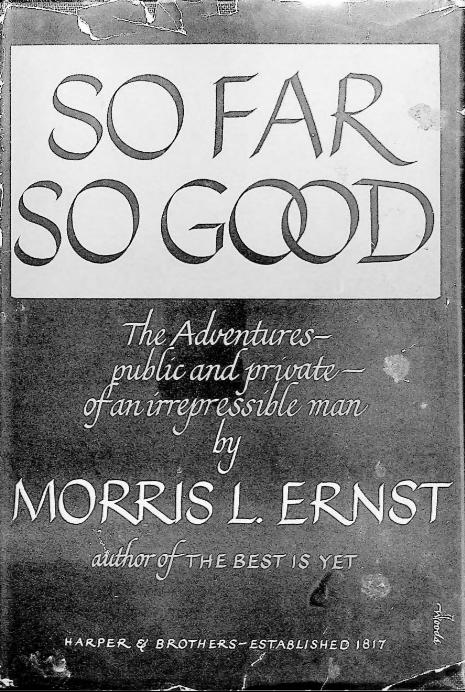
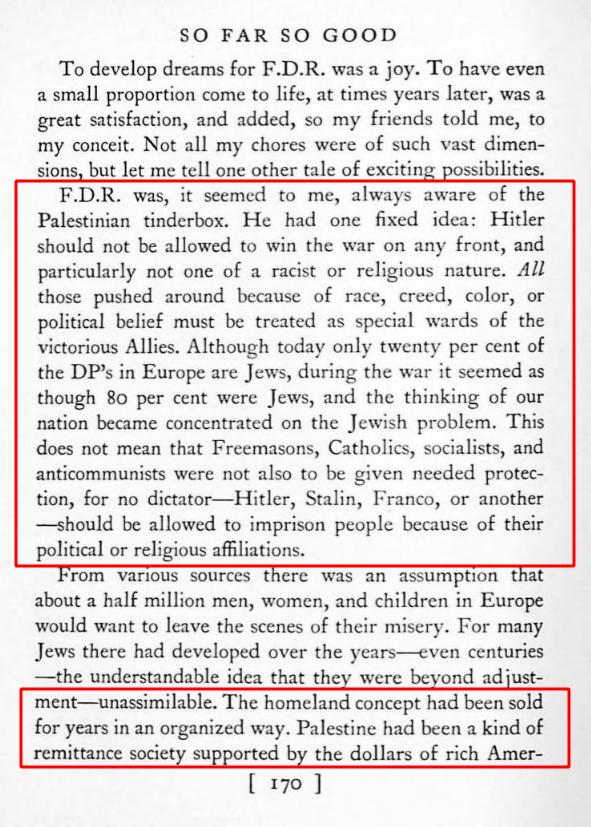
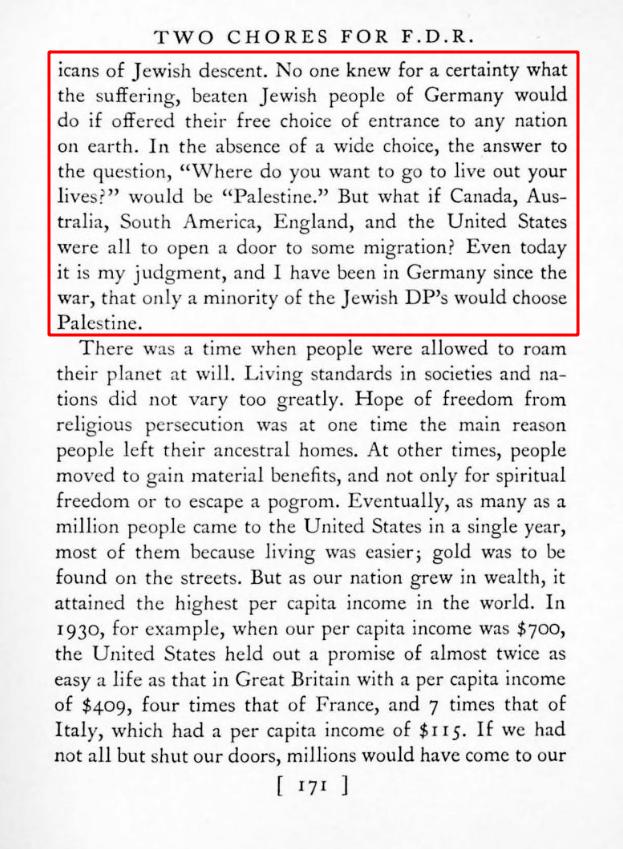
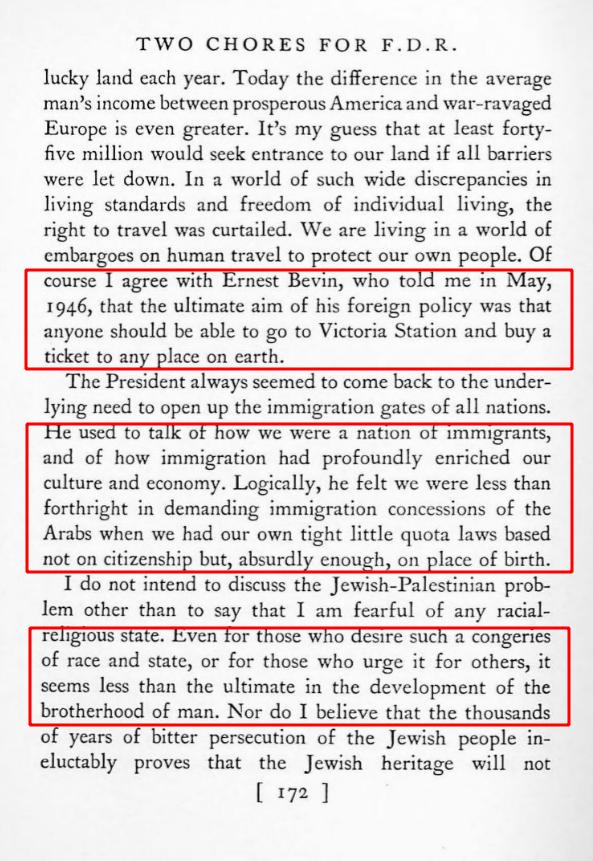
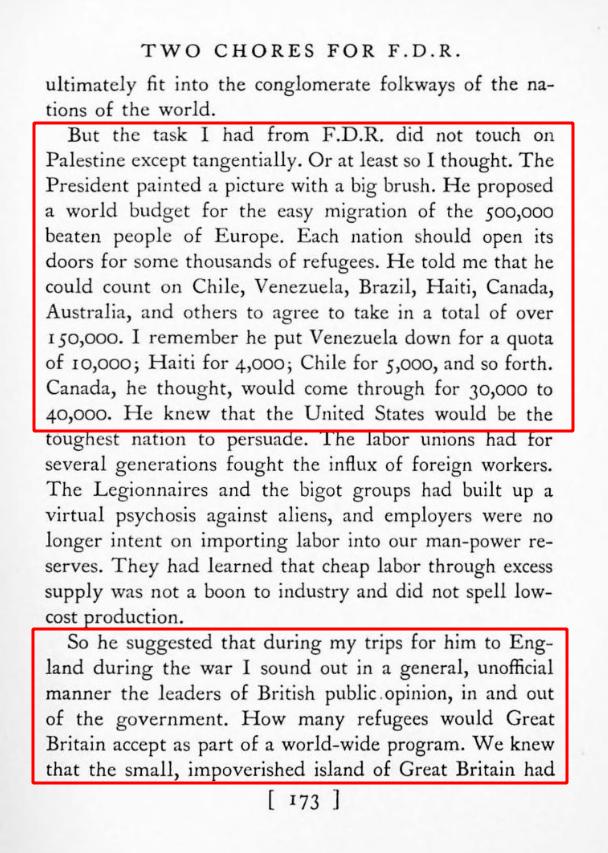
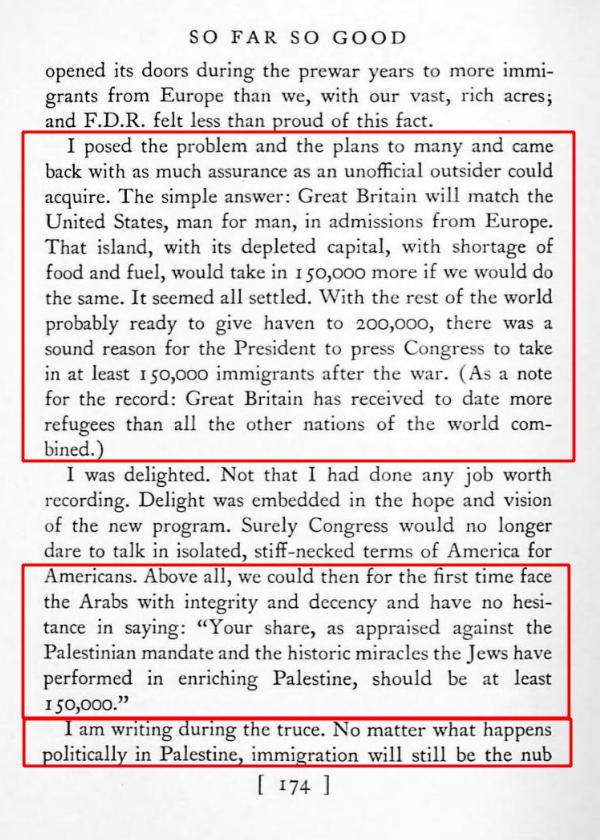
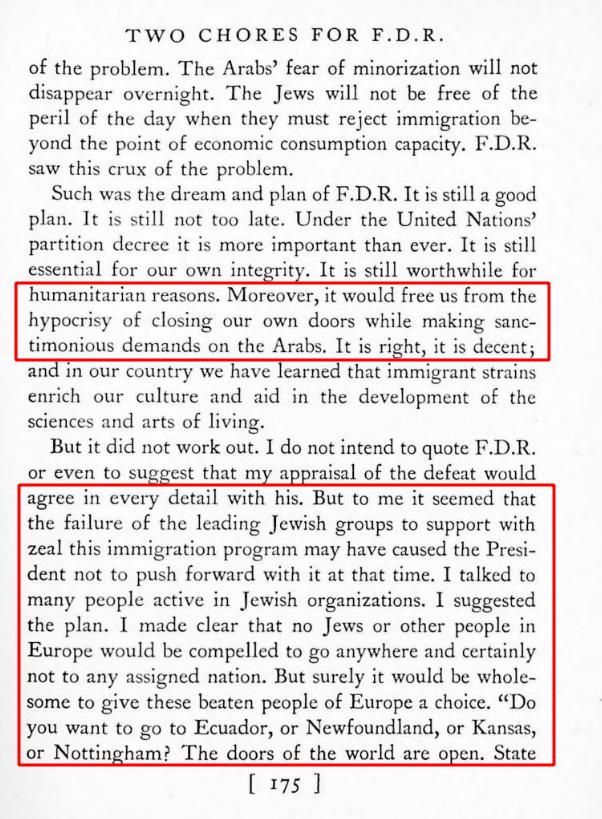
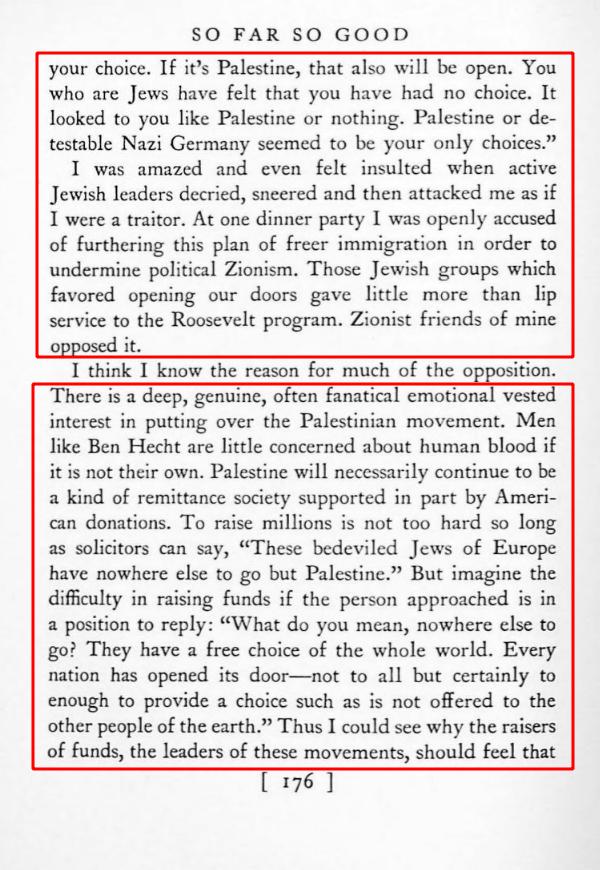
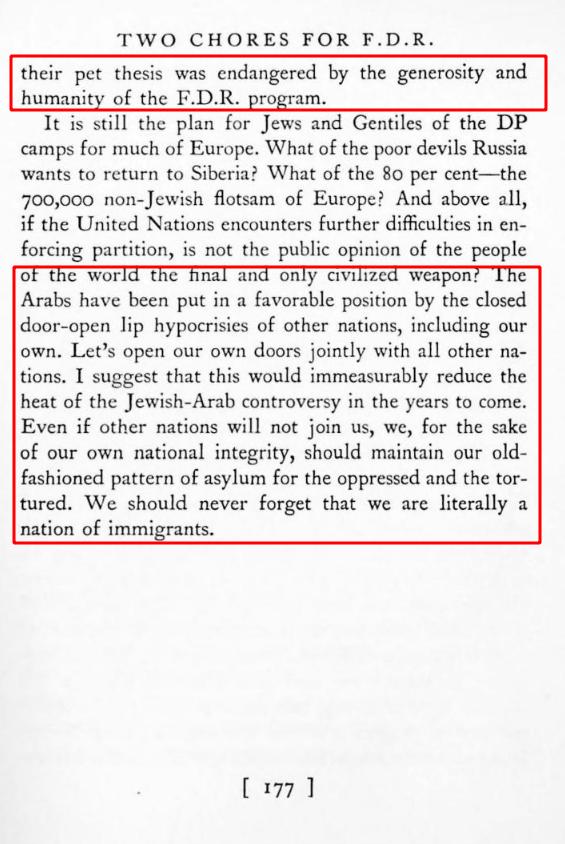
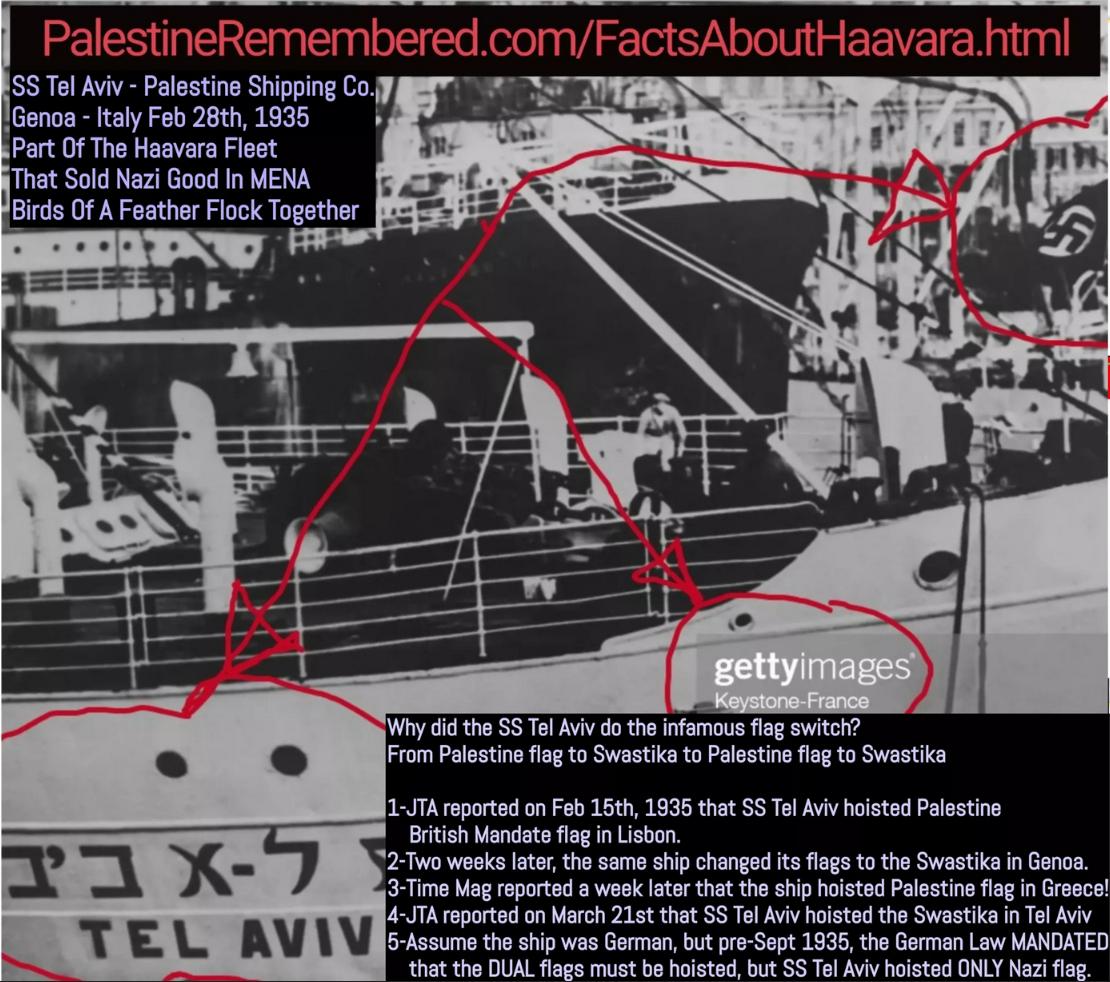


Post Your Comment
*It should be NOTED that your email address won't be shared, and all communications between members will be routed via the website's mail server.